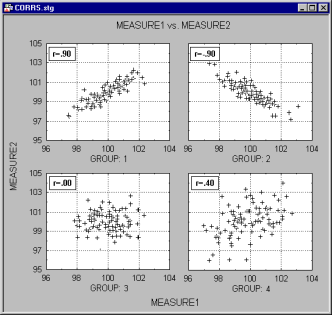Correlations - Introductory Overview
Correlation is a measure of the relation between two or more variables.
The measurement scales used should be at least interval scales, but other correlation coefficients are available to handle other types of data. Correlation coefficients can range from -1.00 to +1.00. The value of -1.00 represents a perfect negative correlation while a value of +1.00 represents a perfect positive correlation. A value of 0.00 represents a lack of correlation.
The most widely-used type of correlation coefficient is Pearson r, also called linear or product-moment correlation. It is the basic type of correlation that is offered in the Basic Statistics and Tables module. More specialized correlations are included in other modules. topic.
Arrangement of data
You can correlate any variables in your data set, but if the selected variables contain nominal data , you need to use a special type of correlation, such as those included in the Crosstabulation tables procedures of Basic Statistics and Tables.
Copyright © 1995-2020 TIBCO Software Inc. All rights reserved.

